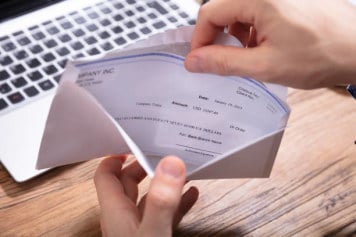Can You Be Employed and Self-Employed?
Given the many ways you can engage in work in the 21st century, each with its own benefits and drawbacks, understanding your professional situation is vital. This is especially true if, like many people, you have more than one job or revenue stream. So can you work for a company and be self-employed? Can you be self-employed and have a limited company? This article has the answers.
How to tell if you’re employed or self-employed?
First and foremost, if you’re self-employed you’re required to pay your own income tax to the Government; if you’re employed, your employer will do this for you. This is the simplest reason why everybody needs to know which kind of employment they are in.
All employers with staff calculate and pay employee income tax using the money the employee has earned; this is not the same as GST (goods and services tax), which will often be seen on bills but should never be on payslips.
 Employees are given a payslip with the details of the total money earned, how much income tax has been deducted, and the amount leftover to be paid into each employee’s bank account.
Employees are given a payslip with the details of the total money earned, how much income tax has been deducted, and the amount leftover to be paid into each employee’s bank account.
Sometimes, employers will also help employees prepare for retirement with a pension plan that will automatically take a little money from earnings and pay it to a pension fund.
If there is no company providing you with a payslip like this, you’re likely self-employed and need to complete a self-assessment declaring how much money you made this financial year (financial years begin in April, not January). It’s very important to complete this correctly.
Many people hire accountants to do their self-assessment as the consequences of making mistakes on your tax return can be severe. Accountants are often able to save you money as they know all the relevant loopholes and exemptions. Utilising accounting programs like Quickbooks or Xero can be a great help with that.
 So, if you receive a payslip with details of tax and pension next to the amount you’ve been paid then you are likely employed. If not, you’ll need to do your own taxes.
So, if you receive a payslip with details of tax and pension next to the amount you’ve been paid then you are likely employed. If not, you’ll need to do your own taxes.
However, if you’re still uncertain of your employment status, all employees will have a contract that will outline you and your employer’s obligations to each other. This will have been given to you to sign with your job offer. Most companies provide electronic copies to their employees to look at any time in addition to a paper copy. If a company never gave you a contract, then you are not employed by that company.
Can you work for a company and be self-employed?
Many companies, especially large ones, have lots of people come and work in their offices that are not their employees. These could be tradespeople like electricians, or specialist financial consultants, or agency office staff hired to fill staff shortages.
In many cases, the above professionals could be self-employed or employed by a different company even though they spend all of their time working in those offices. If you’re in that situation, the easiest way to tell is through your contract.
 In the examples above, the office staff will have employment contracts with their agency, but not the company where they are actually working. That company will have a transactional agreement with the agency.
In the examples above, the office staff will have employment contracts with their agency, but not the company where they are actually working. That company will have a transactional agreement with the agency.
The electrician in the first example is self-employed because they are a professional individual that the company hired. They might be a sole trader or just a qualified individual. Therefore, the electrician would complete the work and present the company with a bill for the service provided which the company would then pay. Even if the electrician works there five days a week, there is no obligation for the company to hire them again, or for the electrician to agree to a sixth day the following week if the jobs they were hired to do have been completed.
Finally, there are contractors, consultants and freelancers that a company might hire on a temporary basis to provide specialized services at a time when they are required. People in these positions may well have a contract with the company, but it will not be a usual employment contract, and these people may still be self-employed. These contractors will not receive maternity or holiday leave, but will still be entitled to health and safety protections which should apply to anyone working or even visiting the office.
Can you be self-employed and have a limited company?
The line between self-employed and employed is the most blurred when it comes to people who own companies. In a small, sole trader company the owner is self-employed. A sole trader is someone who owns and takes all profits from a business but is liable to any losses.
 The electrician from earlier could own and be the only electrician at “John Smith Electricians”. If John breaks one of his tools, he will have to pay for it, because there is no difference between John and John’s company. In this scenario, the electrician is both self-employed and owns the company because legally John is the company.
The electrician from earlier could own and be the only electrician at “John Smith Electricians”. If John breaks one of his tools, he will have to pay for it, because there is no difference between John and John’s company. In this scenario, the electrician is both self-employed and owns the company because legally John is the company.
However, if anybody who starts out as a sole trader becomes the owner of a limited company, they cease to be self-employed. The owner of a limited company that still works for their company is not legally working for themselves but for the company. Owners of companies essentially hire themselves and gain the same rights as any other employee, pay income tax on their wages, and are even entitled to holiday pay.
The biggest difference with limited companies is because they are now an employee, the owner is not financially responsible for the losses of the company. For instance, if they required a replacement tool to complete some work, the company could pay for it out of its own finances because it is now a separate entity.
What about if I have more than one job?
With the prevalence of zero-hour contracts, it’s very common for people to have more than one job, either to make up for a shortage of hours or because they need a little extra to make ends meet. It’s perfectly fine and common for people to be both self-employed and employed in these types of situations.
 However, it is important to check your contract or speak to your employer if any other work you’re doing has the potential to affect your availability for or the quality of work you do for them. Some employed positions, especially in higher roles, will have clauses in their contracts that state no other work can be taken or that if you’re considering taking a second job, you must consult your employer first. Many jobs will not have any such clauses but it is still advisable to inform your employer about this.
However, it is important to check your contract or speak to your employer if any other work you’re doing has the potential to affect your availability for or the quality of work you do for them. Some employed positions, especially in higher roles, will have clauses in their contracts that state no other work can be taken or that if you’re considering taking a second job, you must consult your employer first. Many jobs will not have any such clauses but it is still advisable to inform your employer about this.
One of the advantages of zero-hour contracts is that while you are not guaranteed any hours at all, there is nothing to stop you from filling up the extra time with other work when you need more or if you can get it. So a zero-hour contract might be useful for those early on in a business venture when work is intermittent. This would be another instance of a person being both employed and self-employed.
All in all, employment statuses sound like a bit of a minefield of tax issues and contractual complications, but for most people, it’s really very simple. If you receive a payslip, you’re employed and not self-employed. If you don’t have any job contract, holiday pay, and you do your own taxes, you’re self-employed, not employed. This doesn’t really change even if you’re the owner of a company.
You may also be interested in:
